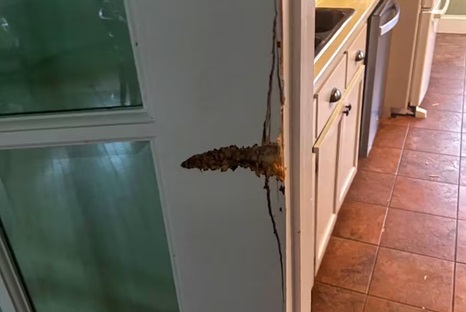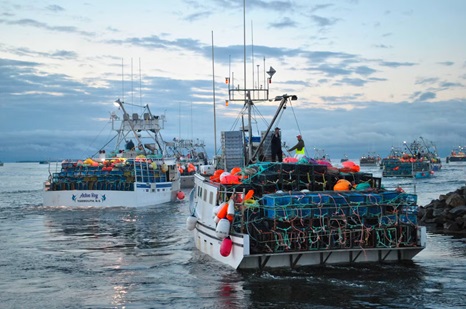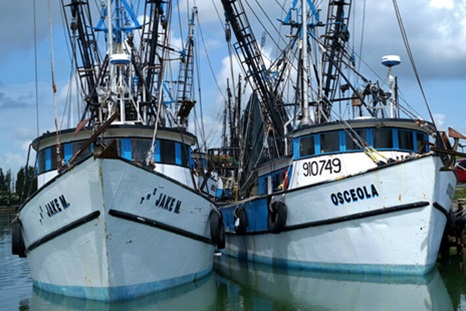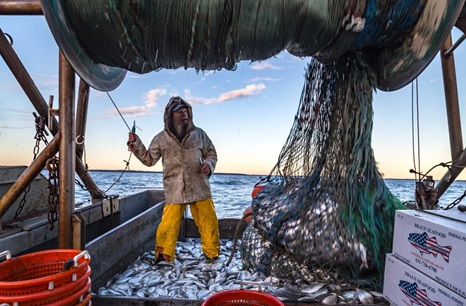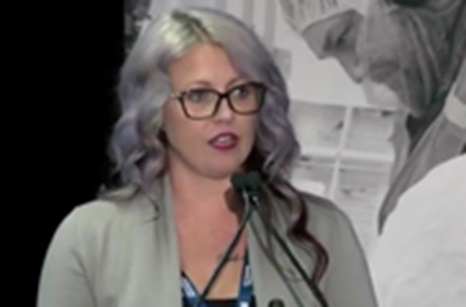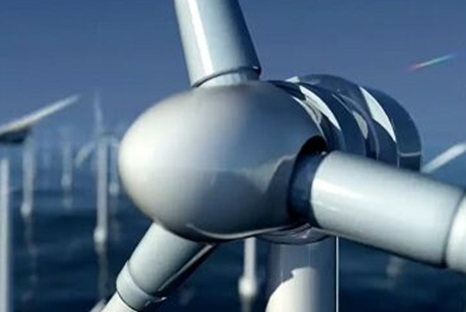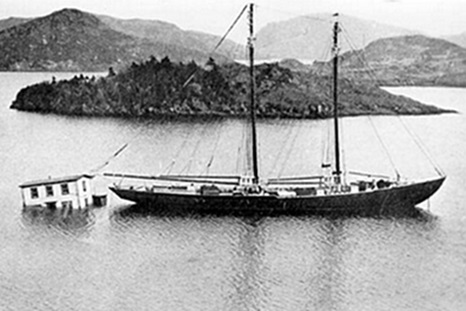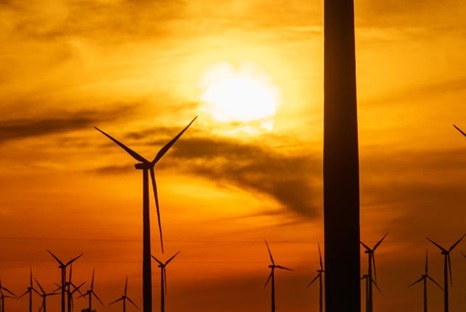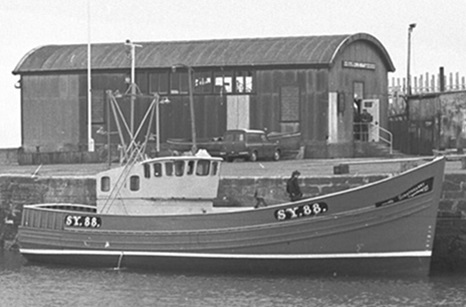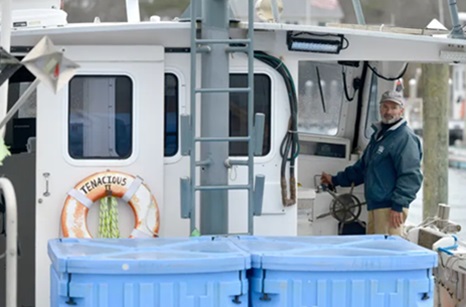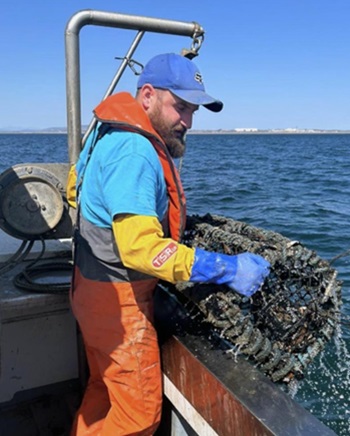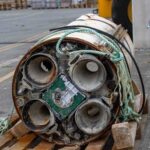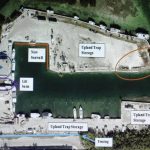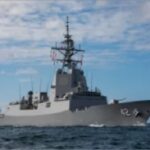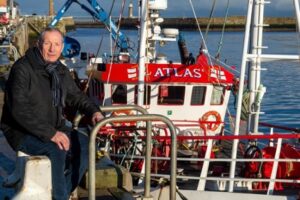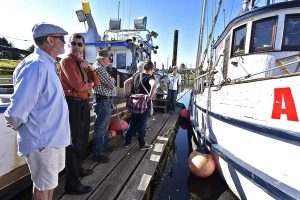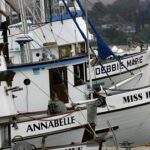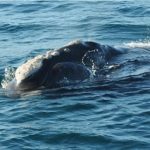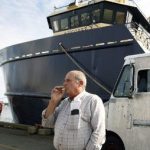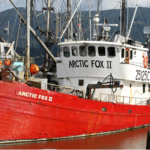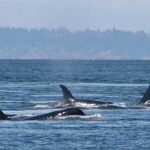A Day on the Bay with Métis Commercial Fisherman Bernie LePage
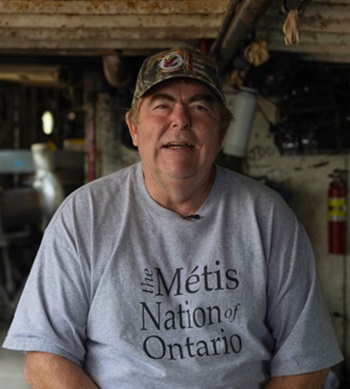 A day in the life of Métis commercial fisherman Bernie LePage starts like any other; with a coffee, a long drive to work and a short walk into the office. For Bernie, his office is the bridge of his fishing tug, and his workplace is the deep blue waters of Georgian Bay. A citizen of the Historic Georgian Bay Métis Community, MNO Region 7, Bernie has been fishing off the coast of Lafontaine since he was a young boy. The LePage family have been fishing out of Penetanguishene Harbour for four generations, dating back to 1861. His ancestors were both blacksmiths and commercial fishermen who used wooden rowboats. “It was tough work just to catch a few fish back then,” says Bernie. Times have certainly changed and the vessel Bernie now uses, which was also used by his father, the ‘Laurie E’, is a 1955 Great Lakes “tug”. The boat was built to handle turbulent waters in Georgian Bay while also hauling tons of fish and fishing gear. more, >>click to read<< 10:00
A day in the life of Métis commercial fisherman Bernie LePage starts like any other; with a coffee, a long drive to work and a short walk into the office. For Bernie, his office is the bridge of his fishing tug, and his workplace is the deep blue waters of Georgian Bay. A citizen of the Historic Georgian Bay Métis Community, MNO Region 7, Bernie has been fishing off the coast of Lafontaine since he was a young boy. The LePage family have been fishing out of Penetanguishene Harbour for four generations, dating back to 1861. His ancestors were both blacksmiths and commercial fishermen who used wooden rowboats. “It was tough work just to catch a few fish back then,” says Bernie. Times have certainly changed and the vessel Bernie now uses, which was also used by his father, the ‘Laurie E’, is a 1955 Great Lakes “tug”. The boat was built to handle turbulent waters in Georgian Bay while also hauling tons of fish and fishing gear. more, >>click to read<< 10:00
Athearn Marine Agency Boat of the Week: 2022 36′ Wayne Beal Lobster Boat, 500 HP C90
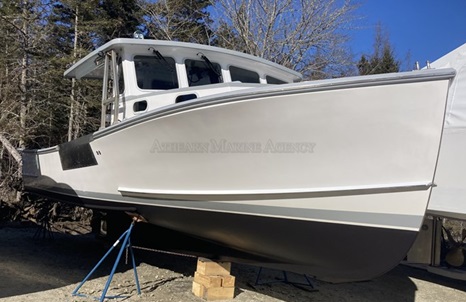 To review specifications, information, and 10 photos’,>click here<, To see all the boats in this series, >click here< 08:40
To review specifications, information, and 10 photos’,>click here<, To see all the boats in this series, >click here< 08:40
Owner of sunken historic fishing boat leaking fuel off Maine’s coast has been charged
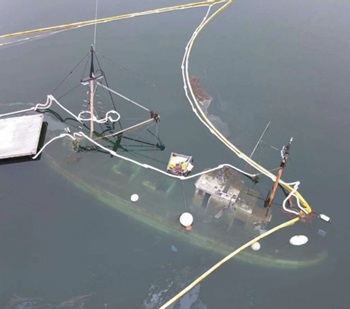 The owner of a sunken 80-foot-long fishing boat that’s sitting at the bottom of New Meadows River in Harpswell and leaking oil is now facing charges. The boat, the sardine carrier Jacob Pike, sank in Harpswell during January’s twin storms and record-high tides. The harbormaster hasn’t received a plan yet for raising and disposing of the sunken boat. The town is summonsing the boat’s owner, Cyrus Cleary, for the crime of abandonment of a watercraft, according to the harbormaster. more, >>click to read<< 06:12
The owner of a sunken 80-foot-long fishing boat that’s sitting at the bottom of New Meadows River in Harpswell and leaking oil is now facing charges. The boat, the sardine carrier Jacob Pike, sank in Harpswell during January’s twin storms and record-high tides. The harbormaster hasn’t received a plan yet for raising and disposing of the sunken boat. The town is summonsing the boat’s owner, Cyrus Cleary, for the crime of abandonment of a watercraft, according to the harbormaster. more, >>click to read<< 06:12
Fisheries minister commits to lifting processing caps, looking for outside buyers ahead of 2024 crab season
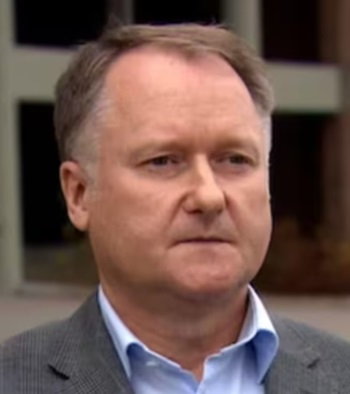 Fisheries Minister Elvis Loveless says he’s willing to meet some of the demands tabled by fish harvesters and their union amid continued protests. In a letter written to the Fish, Food and Allied Workers union on Tuesday — and on the eve of announcing the provincial budget for 2024 — Loveless told union president Greg Pretty the province is committed to raising processing capacity “in the primary processing sector” prior to the start of the 2024 fishery. However, the extent of the increase will be informed, in part, by the total allowable catch that is yet to be announced by the federal fisheries minister. Further, Loveless said his department will issue an expression of interest for outside buyers for the 2024 snow crab fishery on Tuesday. more, >>click to read<< 15:44
Fisheries Minister Elvis Loveless says he’s willing to meet some of the demands tabled by fish harvesters and their union amid continued protests. In a letter written to the Fish, Food and Allied Workers union on Tuesday — and on the eve of announcing the provincial budget for 2024 — Loveless told union president Greg Pretty the province is committed to raising processing capacity “in the primary processing sector” prior to the start of the 2024 fishery. However, the extent of the increase will be informed, in part, by the total allowable catch that is yet to be announced by the federal fisheries minister. Further, Loveless said his department will issue an expression of interest for outside buyers for the 2024 snow crab fishery on Tuesday. more, >>click to read<< 15:44
Closure of Eastern Seafood | The end for Matane shrimp?
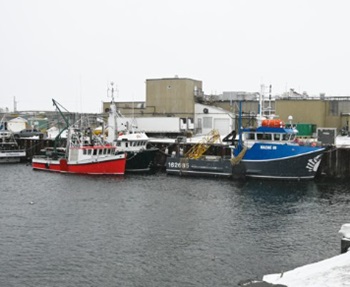 A few days before the start of the fishing season, the oldest shrimp processing plant in Quebec closes its doors. The Danish company Royal Greenland announced on Monday that it was closing down the Eastern Seafood processing plant. The mayor of Matane, Eddy Métivier, speaks of “a total surprise” as the Danish company had recently invested millions to add lobster and crab processing to its activities, in addition to building 71 housing units for its temporary workers. “We are in shock, it’s really a hard blow,” he said in an interview. It is a symbol for Matane. It’s like putting an end to historical fishing traditions. In this sense, too, it is a mourning. more, >>clicck to read<< 14:29
A few days before the start of the fishing season, the oldest shrimp processing plant in Quebec closes its doors. The Danish company Royal Greenland announced on Monday that it was closing down the Eastern Seafood processing plant. The mayor of Matane, Eddy Métivier, speaks of “a total surprise” as the Danish company had recently invested millions to add lobster and crab processing to its activities, in addition to building 71 housing units for its temporary workers. “We are in shock, it’s really a hard blow,” he said in an interview. It is a symbol for Matane. It’s like putting an end to historical fishing traditions. In this sense, too, it is a mourning. more, >>clicck to read<< 14:29
Federal Government Picks New England Offshore Wind Power Site, Drawing Cheers and Questions Alike
 The federal government on Friday designated a large area off the New England coast for offshore wind production development, setting the stage for a possible lease sale within the Gulf of Maine. The U.S. Bureau of Ocean Energy Management said in a statement that the New England zone, which renewable energy advocates have identified as crucial for the growth of wind power, “avoids important areas for lobster fishing, North Atlantic right whale habitat, and other important fishing areas and habitats.” The move came a day after the country’s first commercial-scale offshore wind farm opened off Montauk Point, New York. Environmental groups cheered the announcement, but some members of the commercial fishing industry, which has opposed wind development in areas where they trap lobsters, said they still have concerns about locating offshore wind in the area. more, >>click to read<< 12:23
The federal government on Friday designated a large area off the New England coast for offshore wind production development, setting the stage for a possible lease sale within the Gulf of Maine. The U.S. Bureau of Ocean Energy Management said in a statement that the New England zone, which renewable energy advocates have identified as crucial for the growth of wind power, “avoids important areas for lobster fishing, North Atlantic right whale habitat, and other important fishing areas and habitats.” The move came a day after the country’s first commercial-scale offshore wind farm opened off Montauk Point, New York. Environmental groups cheered the announcement, but some members of the commercial fishing industry, which has opposed wind development in areas where they trap lobsters, said they still have concerns about locating offshore wind in the area. more, >>click to read<< 12:23
California’s commercial salmon fishermen face another disaster of a season amid proposed federal restrictions
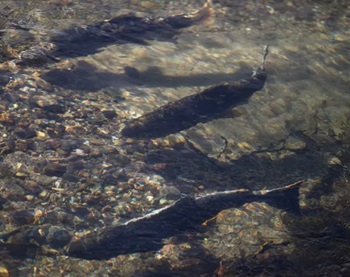 A regional fishery council is mulling three proposals for commercial salmon season, with one canceling the season entirely and the other two severely limiting how long the season would last and how many salmon could be taken. While two of the proposed options do offer limited commercial fishing opportunities, at least one local fisherman says the restrictions would significantly curb the viability of salmon fishing. “These really aren’t a viable option for anyone,” said Tim Obert, a Ben Lomond resident who’s been fishing salmon commercially for close to 20 years. Obert is president of the Santa Cruz Commercial Fishermen’s Association, sits on the state of California’s Dungeness Crab Task Force and is also a part of several working groups that advised the council in coming up with the alternative proposals. more, >>click to read<< 11:07
A regional fishery council is mulling three proposals for commercial salmon season, with one canceling the season entirely and the other two severely limiting how long the season would last and how many salmon could be taken. While two of the proposed options do offer limited commercial fishing opportunities, at least one local fisherman says the restrictions would significantly curb the viability of salmon fishing. “These really aren’t a viable option for anyone,” said Tim Obert, a Ben Lomond resident who’s been fishing salmon commercially for close to 20 years. Obert is president of the Santa Cruz Commercial Fishermen’s Association, sits on the state of California’s Dungeness Crab Task Force and is also a part of several working groups that advised the council in coming up with the alternative proposals. more, >>click to read<< 11:07
Awards 2023: Best Prawn Trawler – Zenith – Macduff Ship Design
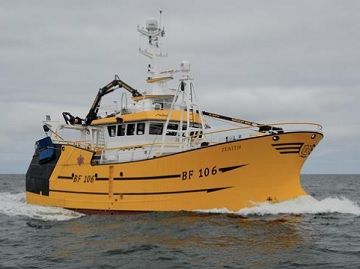 Macduff Ship Design fishing boats have charms and attractions all of their own. They are rugged, safe and very economical and long-lasting (as they have to be in Scotland). Built to highly refined designs, they operate in often-terrible weather. In this case, Zenith was designed to fish for prawns out of the delightful port of Fraserburgh on the grey, gloomy North Sea. She is sure to do very well commercially. more, >>click to read<< 09:45
Macduff Ship Design fishing boats have charms and attractions all of their own. They are rugged, safe and very economical and long-lasting (as they have to be in Scotland). Built to highly refined designs, they operate in often-terrible weather. In this case, Zenith was designed to fish for prawns out of the delightful port of Fraserburgh on the grey, gloomy North Sea. She is sure to do very well commercially. more, >>click to read<< 09:45
Biden administration sued over Virginia offshore wind farm approval
 A conservative think tank on Monday sued the Biden administration in an effort to reverse approval of what would be the largest offshore wind farm of its kind. The Heartland Institute filed the suit with the Committee for a Constructive Tomorrow, a nonprofit that advocates for an economically libertarian approach to environmental action and has denied the existence of human-caused climate change. The lawsuit, filed in the U.S. District Court for the District of Columbia, seeks to reverse the National Marine Fisheries Service (NMFS) Bureau of Ocean Energy Management’s (BOEM) approval of Dominion Energy’s 176-turbine wind project offshore Virginia. more, >>click to read<< 08:30
A conservative think tank on Monday sued the Biden administration in an effort to reverse approval of what would be the largest offshore wind farm of its kind. The Heartland Institute filed the suit with the Committee for a Constructive Tomorrow, a nonprofit that advocates for an economically libertarian approach to environmental action and has denied the existence of human-caused climate change. The lawsuit, filed in the U.S. District Court for the District of Columbia, seeks to reverse the National Marine Fisheries Service (NMFS) Bureau of Ocean Energy Management’s (BOEM) approval of Dominion Energy’s 176-turbine wind project offshore Virginia. more, >>click to read<< 08:30
Steaming on sunshine – fishing with solar power
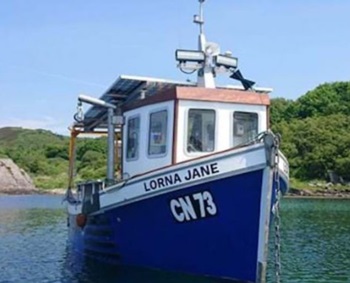 Tayvallich fisherman and boatbuilder Hans Unkles has outfitted 6.40-metre potting boat Lorna Jane to run on solar power. He has owned and skippered nine potting boats, andworks the latest of these on a part-time basis, fishing for lobsters two or three days a week. It was his expertise and a deep interest in renewable energy that led to outfitting Lorna Jane with solar panels to make it the UK’s first fully electric commercial fishing vessel. ‘I worry our fishing industry is missing the boat. With our current trajectory towards Net-Zero our vessels will be worthless. The process of wind and sun creating energy is fascinating to me, so I thought I could be the right person to give it ago,’ Hans Unkles said. Photos, more, >>click to read<< 07:04
Tayvallich fisherman and boatbuilder Hans Unkles has outfitted 6.40-metre potting boat Lorna Jane to run on solar power. He has owned and skippered nine potting boats, andworks the latest of these on a part-time basis, fishing for lobsters two or three days a week. It was his expertise and a deep interest in renewable energy that led to outfitting Lorna Jane with solar panels to make it the UK’s first fully electric commercial fishing vessel. ‘I worry our fishing industry is missing the boat. With our current trajectory towards Net-Zero our vessels will be worthless. The process of wind and sun creating energy is fascinating to me, so I thought I could be the right person to give it ago,’ Hans Unkles said. Photos, more, >>click to read<< 07:04
Cancelling legal elver fishery has not stopped poaching in N.S.
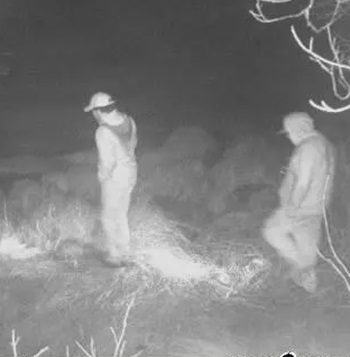 Nova Scotia RCMP have charged a Parrsboro man with multiple criminal counts after a night time altercation with fishery officers attempting to stop illegal elver fishing in Hubbards this weekend. The Department of Fisheries and Oceans says its officers tried to inspect a vehicle on Saturday “as part of their normal activities to deter and disrupt unauthorized elver harvest.” “An individual obstructed fishery officers from conducting the inspection and struck the officers with their vehicle while fleeing to attempt to avoid arrest. “The fishery officers involved were not injured and alerted local RCMP to the incident,” more, >>click to read<< 19:03
Nova Scotia RCMP have charged a Parrsboro man with multiple criminal counts after a night time altercation with fishery officers attempting to stop illegal elver fishing in Hubbards this weekend. The Department of Fisheries and Oceans says its officers tried to inspect a vehicle on Saturday “as part of their normal activities to deter and disrupt unauthorized elver harvest.” “An individual obstructed fishery officers from conducting the inspection and struck the officers with their vehicle while fleeing to attempt to avoid arrest. “The fishery officers involved were not injured and alerted local RCMP to the incident,” more, >>click to read<< 19:03
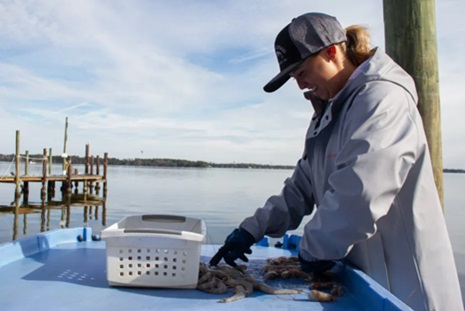
Shrimpin’ Ain’t Easy
Flicking heads off shrimp is one of the first jobs you learn when you’re born a Davis. Joseph “Jody” Davis remembers filling up a bucket of beheaded shrimp for his grandmother for a quarter when he was just 4 years old. “It wasn’t bad money in the ’70s,” he said, standing on the dock of Davis Seafood, the family business in Sneads Ferry. His 25-year-old daughter, Hannah, swiftly beheads a just-caught batch for a customer order. Muscle memory fills the bin. “We’ve been at this exact spot since 1949,” he said. “But we’ve been commercial fishermen for centuries.” The Davis Seafood office door is decorated with two stickers bearing the same mantra: “FRIENDS DON’T LET FRIENDS EAT IMPORTED SHRIMP.” Customers notice it and laugh. “But it’s more than just comedy,” Davis said. “It’s a way of life for us. And if people just cast us aside, we’re done.” photos, more, >>click to read<< 16:12
Stock Assessments Benefit from Rockhopper Trawl Efficiency Study
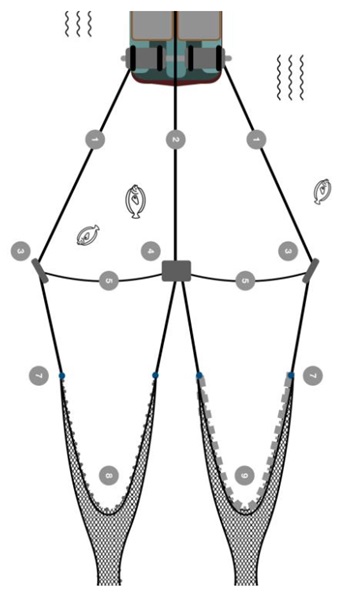 A collaborative study conducted aboard a Rhode Island-based commercial trawler from 2015 to 2017 is bearing fruit. It was led by the Northeast Fisheries Science Center and commercial fishermen interested in how catches of the same species varied depending on the type of trawl net used. Since 2019, stock assessment scientists have used the results from this Northeast Trawl Advisory Panel study in multiple stock assessments to ensure sustainable fisheries for several flounder species as well as monkfish and red hake. Specifically, the results help produce more accurate estimates of abundance which can increase the confidence in catch advice for some species. “Cooperative research is essential to obtain accurate assessments and catch advice in our nation’s fisheries,” said Chris Roebuck, former Northeast Trawl Advisory Panel member, commercial fisherman and participant in the experiment. “This research is an excellent example of collaboration between scientists and fishermen. It provided solid efficiency numbers for each targeted species,” he said. “The information produced was clearly the best available science and has the potential to ultimately influence catch advice for every species evaluated.” Photos, lots of links, more, >>click to read<< 12:29
A collaborative study conducted aboard a Rhode Island-based commercial trawler from 2015 to 2017 is bearing fruit. It was led by the Northeast Fisheries Science Center and commercial fishermen interested in how catches of the same species varied depending on the type of trawl net used. Since 2019, stock assessment scientists have used the results from this Northeast Trawl Advisory Panel study in multiple stock assessments to ensure sustainable fisheries for several flounder species as well as monkfish and red hake. Specifically, the results help produce more accurate estimates of abundance which can increase the confidence in catch advice for some species. “Cooperative research is essential to obtain accurate assessments and catch advice in our nation’s fisheries,” said Chris Roebuck, former Northeast Trawl Advisory Panel member, commercial fisherman and participant in the experiment. “This research is an excellent example of collaboration between scientists and fishermen. It provided solid efficiency numbers for each targeted species,” he said. “The information produced was clearly the best available science and has the potential to ultimately influence catch advice for every species evaluated.” Photos, lots of links, more, >>click to read<< 12:29
What You Need to Know About Cod
As a large, naturally abundant fish, cod has been eaten by various human populations for centuries. 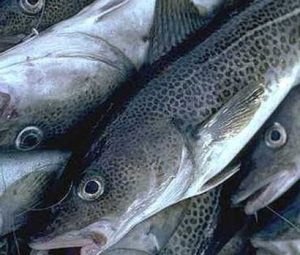 While both of America’s Atlantic cod fisheries are overfished, American stocks of Pacific cod (Gadus macrocephalus) are not. What’s more, various other cod fisheries are located around the globe, some over-exploited, others not. The fish’s prevalence, along with its suitability for eating, means that despite dwindling numbers, cod remains a stalwart of many cuisines. However, there are many things about cod that aren’t widely known. It might surprise some people to learn that cod hunt for prey. They eat a variety of animals, ranging from worms to lobsters and even small fish. Such a diet means cod are capable of growing up to an impressive length of six feet and a weight of over 100 pounds. more, >>click to read<< 11:52
While both of America’s Atlantic cod fisheries are overfished, American stocks of Pacific cod (Gadus macrocephalus) are not. What’s more, various other cod fisheries are located around the globe, some over-exploited, others not. The fish’s prevalence, along with its suitability for eating, means that despite dwindling numbers, cod remains a stalwart of many cuisines. However, there are many things about cod that aren’t widely known. It might surprise some people to learn that cod hunt for prey. They eat a variety of animals, ranging from worms to lobsters and even small fish. Such a diet means cod are capable of growing up to an impressive length of six feet and a weight of over 100 pounds. more, >>click to read<< 11:52
NCFA Weekly Update for March 18, 2024
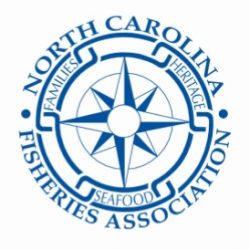 The South Atlantic Fisheries Management Council (SAFMC) met the first full week of March in Jekyll Island, Georgia. The main items discussed at this meeting were king and Spanish mackerel tournament sales, Black Sea bass, red snapper, for-hire reporting, and the commercial permitting structure in the snapper grouper fishery. King and Spanish mackerel tournament sales were discussed by the council but no votes were taken on this issue. It is my understanding that the council wants to wait and see what the public has to say about tournament sales and many other mackerel related issues at the upcoming mackerel port meetings before making any decisions. As always if you have any questions or comment please reach out. more, >>click to read<< 10:46
The South Atlantic Fisheries Management Council (SAFMC) met the first full week of March in Jekyll Island, Georgia. The main items discussed at this meeting were king and Spanish mackerel tournament sales, Black Sea bass, red snapper, for-hire reporting, and the commercial permitting structure in the snapper grouper fishery. King and Spanish mackerel tournament sales were discussed by the council but no votes were taken on this issue. It is my understanding that the council wants to wait and see what the public has to say about tournament sales and many other mackerel related issues at the upcoming mackerel port meetings before making any decisions. As always if you have any questions or comment please reach out. more, >>click to read<< 10:46
Offshore wind or tribal rights? Biden’s California dilemma.
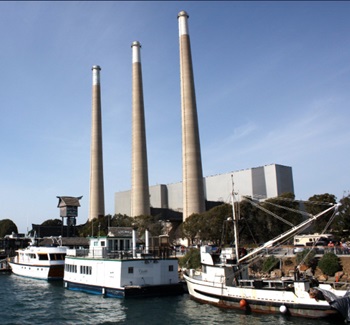 Several offshore wind developers want to build the state’s first farms off the coast here, projects that are needed for California and the White House to reach decarbonization goals. But this summer, the administration is also likely to designate the Chumash Heritage National Marine Sanctuary in coastal waters that surround Morro Bay, a plan that the offshore wind industry says blocks their access to the grid. Equinor, Golden State Wind and Invenergy California Offshore, companies with offshore wind farms planned off the bay, hope to carve out guaranteed paths for their power lines to reach shore, when the NOAA finalizes the sanctuary in coming months. “The ocean should not be the sacrificial lamb for our unquenchable thirst for energy,” said Violet Sage Walker, chair of the Northern Chumash Tribal Council, the Indigenous tibe that proposed the marinre sanctuary to NOAA. more, >>click to read<< 09:29
Several offshore wind developers want to build the state’s first farms off the coast here, projects that are needed for California and the White House to reach decarbonization goals. But this summer, the administration is also likely to designate the Chumash Heritage National Marine Sanctuary in coastal waters that surround Morro Bay, a plan that the offshore wind industry says blocks their access to the grid. Equinor, Golden State Wind and Invenergy California Offshore, companies with offshore wind farms planned off the bay, hope to carve out guaranteed paths for their power lines to reach shore, when the NOAA finalizes the sanctuary in coming months. “The ocean should not be the sacrificial lamb for our unquenchable thirst for energy,” said Violet Sage Walker, chair of the Northern Chumash Tribal Council, the Indigenous tibe that proposed the marinre sanctuary to NOAA. more, >>click to read<< 09:29
Anglers seek trawler buffer zone as Atlantic herring stock declines
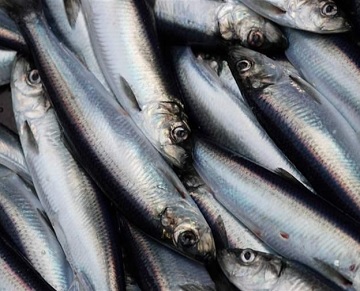 Recreational fishermen in New England say commercial trawlers are threatening the survival of smaller businesses relying on a healthy stock of Atlantic herring. Rich Hittinger, first vice president of the Rhode Island Saltwater Anglers Association, said years of overfishing depleted the population and continue to have negative effects on the ocean ecosystem. “The predator fish, like the striped bass, they’re scrounging for anything that they can eat,” Hittinger observed. “And we often see fish that are long and thin because they’re really not getting sufficient nutrition.” Hittinger noted anglers want the New England Fishery Management Council to reestablish a 12-mile offshore buffer zone to force large commercial trawlers out to sea and reduce conflicts with businesses closer to shore. The council is accepting public comments through April. more, >>click to read<< 06:27
Recreational fishermen in New England say commercial trawlers are threatening the survival of smaller businesses relying on a healthy stock of Atlantic herring. Rich Hittinger, first vice president of the Rhode Island Saltwater Anglers Association, said years of overfishing depleted the population and continue to have negative effects on the ocean ecosystem. “The predator fish, like the striped bass, they’re scrounging for anything that they can eat,” Hittinger observed. “And we often see fish that are long and thin because they’re really not getting sufficient nutrition.” Hittinger noted anglers want the New England Fishery Management Council to reestablish a 12-mile offshore buffer zone to force large commercial trawlers out to sea and reduce conflicts with businesses closer to shore. The council is accepting public comments through April. more, >>click to read<< 06:27
Iceland volcano spews smoke, lava in 4th eruption since December – Nearby fishing town evacuated
 A volcano in Iceland erupted for the fourth time since December on Saturday, the country’s meteorological office said, spewing smoke and bright orange lava into the air in sharp contrast against the dark night sky. The eruption began at 8:23 p.m. local time and the fissure was estimated to be about 2.9 kilometres long, roughly the same size as the last eruption in February, the Icelandic Meteorological Office said in a statement. Authorities had warned for weeks that an eruption was imminent on the Reykjanes peninsula, just south of Iceland’s capital, Reykjavik. Lava appeared to be flowing rapidly south toward the nearby fishing town of Grindavik, where a few of the nearly 4,000 residents had returned following earlier outbreaks, the Met Office said. Video, photos, more, >>click to read<< 12:32
A volcano in Iceland erupted for the fourth time since December on Saturday, the country’s meteorological office said, spewing smoke and bright orange lava into the air in sharp contrast against the dark night sky. The eruption began at 8:23 p.m. local time and the fissure was estimated to be about 2.9 kilometres long, roughly the same size as the last eruption in February, the Icelandic Meteorological Office said in a statement. Authorities had warned for weeks that an eruption was imminent on the Reykjanes peninsula, just south of Iceland’s capital, Reykjavik. Lava appeared to be flowing rapidly south toward the nearby fishing town of Grindavik, where a few of the nearly 4,000 residents had returned following earlier outbreaks, the Met Office said. Video, photos, more, >>click to read<< 12:32
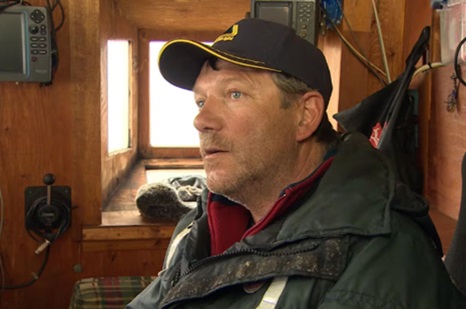
An appeal for seal: Supporters say it’s time to review bans on ‘sustainable’ industry
Fisheries managers allow some 400,000 harp seals to be harvested annually, but the allowable catch hasn’t been taken in the past 15 years. These days, hunters only take about 40,000 seals because of international bans that have dramatically reduced access to markets. The United States has had a ban on seal products since 1972, the European Union banned seal products in 2009, and the Chinese market also has restrictions. But while the sealing industry struggles to stay alive, it’s a way of life that continues. Eldred Woodford, president of the Canadian Sealers Association, has been eating seal his entire life. He’s frustrated that more people aren’t seeing the value of an abundant food source just off the coast. “It’s a waste of a resource. That’s what it is,” he said. more, >>click to read<< 10:03
Commentary: Nuclear Energy Is the Only Way to Achieve Maine’s Climate Goals
 In response to a rise in climate anxiety, particularly among young voters, politicians have made numerous “climate pledges” to transition entire networks to carbon-free energy sources. These goals are noble. Whether they are realistic remains to be seen, but Maine’s legislature has a chance to make these intentions a reality — without breaking the bank for consumers. Since Maine Gov. Janet Mills pledged to make the state carbon-neutral by 2045, consumers have seen a massive uptick in energy costs, with Mainers paying 23% more than the national average electric bill. State Rep. Reagan Paul has introduced LD 1549 in the legislature to examine whether small modular nuclear reactors (SMRs) have a role to play in the state’s energy mix. more, >>click to read<< 07:10
In response to a rise in climate anxiety, particularly among young voters, politicians have made numerous “climate pledges” to transition entire networks to carbon-free energy sources. These goals are noble. Whether they are realistic remains to be seen, but Maine’s legislature has a chance to make these intentions a reality — without breaking the bank for consumers. Since Maine Gov. Janet Mills pledged to make the state carbon-neutral by 2045, consumers have seen a massive uptick in energy costs, with Mainers paying 23% more than the national average electric bill. State Rep. Reagan Paul has introduced LD 1549 in the legislature to examine whether small modular nuclear reactors (SMRs) have a role to play in the state’s energy mix. more, >>click to read<< 07:10
Rock lobster counting continues a 55-year project that reliably predicts its $240 million per year future
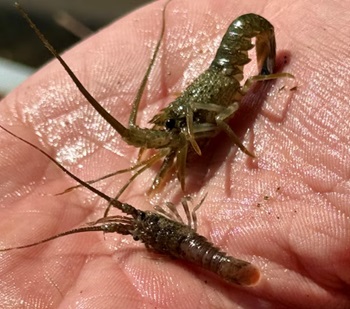 A program recording baby lobster numbers along the WA coast has been running since 1968, creating an invaluable data set. It allows scientists to reliably predict the health of the $240 million per year rock lobster industry into the future. Researchers continue to haul puerulus counters out of the water at nine sites along the coast every month. Fishing is a game of risk and reward the world over, but off the Western Australian coast the odds of a good catch are stacked in crayfishers’ favour. The $240 million per year western rock lobster industry, WA’s most valuable fishery, which was worth as much as $400m pre-COVID — has the unique ability to predict its catch four years into the future, all thanks to the work of a curious scientist more than 55 years ago. photos, more, >>click to read<< 19:34
A program recording baby lobster numbers along the WA coast has been running since 1968, creating an invaluable data set. It allows scientists to reliably predict the health of the $240 million per year rock lobster industry into the future. Researchers continue to haul puerulus counters out of the water at nine sites along the coast every month. Fishing is a game of risk and reward the world over, but off the Western Australian coast the odds of a good catch are stacked in crayfishers’ favour. The $240 million per year western rock lobster industry, WA’s most valuable fishery, which was worth as much as $400m pre-COVID — has the unique ability to predict its catch four years into the future, all thanks to the work of a curious scientist more than 55 years ago. photos, more, >>click to read<< 19:34
Seal oil is the best source of omega-3 and other facts about Canada’s misunderstood seal harvest
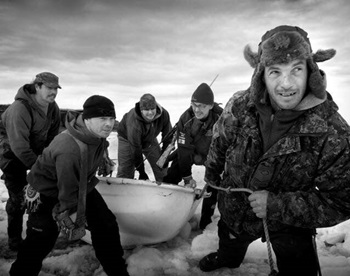 Contrary to narratives spun by anti-sealing groups for decades, this practice is a testament to resilience and a crucial pillar of sustainability and economic survival. Despite numerous fear factors, some substantiated and others frivolous, coastal communities still rely on and support the responsible harvest of seals. For coastal Canadians, the ocean has been and continues to be a source of food, economic activity, recreation, and livelihood. Let’s follow the facts trail: The seal harvest uses techniques designed by a panel of international expert veterinarians. Seals eat 53 times more fish yearly than the entire Eastern Canadian fishing fleet catches. Government scientists have stated that seal predation is preventing the rebuilding of five fish species listed under the Species at Risk Act. >> click to read <<14:52
Contrary to narratives spun by anti-sealing groups for decades, this practice is a testament to resilience and a crucial pillar of sustainability and economic survival. Despite numerous fear factors, some substantiated and others frivolous, coastal communities still rely on and support the responsible harvest of seals. For coastal Canadians, the ocean has been and continues to be a source of food, economic activity, recreation, and livelihood. Let’s follow the facts trail: The seal harvest uses techniques designed by a panel of international expert veterinarians. Seals eat 53 times more fish yearly than the entire Eastern Canadian fishing fleet catches. Government scientists have stated that seal predation is preventing the rebuilding of five fish species listed under the Species at Risk Act. >> click to read <<14:52
Maine Lobstermen’s Association Releases Statement on Final Wind Energy Area
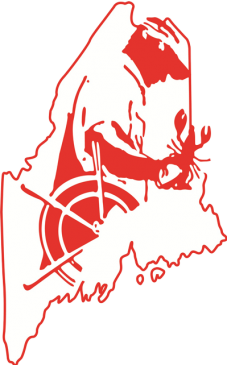 “The Maine Lobstermen’s Association (MLA) appreciates that BOEM’s Final Wind Energy Area (WEA) removes Lobster Management Area 1. “MLA worked tirelessly with Maine’s fishing industry, our congressional delegation, and Governor Mills to ensure prime lobster fishing grounds are spared from industrial development. We are proud that so many lobstermen have constructively engaged in this process and grateful that the Bureau of Ocean Energy Management has listened to their concerns. “But there is still much work to do. Secondary Area C, an area where many endangered North Atlantic right whales are sighted, is included in the Final Wind Energy Area. MLA remains steadfast in its position that no area of the Gulf of Maine should be industrialized with offshore wind. There are still too many unanswered questions about the impacts of offshore wind on the marine environment, commercial fishermen and our fishing heritage.” https://www.mainelobstermen.org/ 12:57
“The Maine Lobstermen’s Association (MLA) appreciates that BOEM’s Final Wind Energy Area (WEA) removes Lobster Management Area 1. “MLA worked tirelessly with Maine’s fishing industry, our congressional delegation, and Governor Mills to ensure prime lobster fishing grounds are spared from industrial development. We are proud that so many lobstermen have constructively engaged in this process and grateful that the Bureau of Ocean Energy Management has listened to their concerns. “But there is still much work to do. Secondary Area C, an area where many endangered North Atlantic right whales are sighted, is included in the Final Wind Energy Area. MLA remains steadfast in its position that no area of the Gulf of Maine should be industrialized with offshore wind. There are still too many unanswered questions about the impacts of offshore wind on the marine environment, commercial fishermen and our fishing heritage.” https://www.mainelobstermen.org/ 12:57
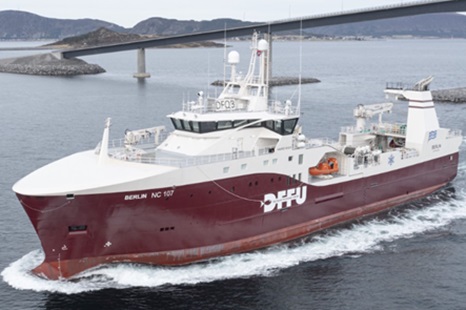
High-Tech Trawler offers New Opportunities
‘It looks good,’ said Sigurður Óli Kristjánsson, skipper of new factory trawler Berlin as he was preparing to head back to Norway for a shakedown trip to fine-tune the sophisticated processing deck. Berlin is the latest Vard design trawlers over the last few years, delivered to Nergård, Luntos and other fishing companies, and is practically identical to Akraberg, which was built for Faroese company Framherji in 2022. ‘It’s a very fine trawler, very high-tech. I like the look of the winches. These are very sophisticated and precise, with Scantrol management systems, and with energy-saving functionality. These trawlers have more power, with a nine-cylinder engine, and everything is a size up from the old Berlin. The thinking is that it’s more economic to have a more powerful engine that can run at a more econonic speed instead of being at full revs,’ he said and added that this is a departure from running the main engine at a set speed and then adjusting the propeller pitch as required. Photos, video, more, >>click to read<< 11:14
State lawsuit claims federal government owes Alaska $700 billion for quashing Pebble mine
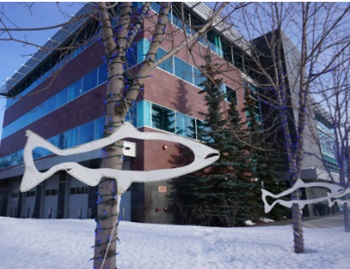 The federal government owes Alaska more than $700 billion in compensation for the 2023 Environmental Protection Agency action that blocked development of the massive and controversial Pebble Mine in Southwest Alaska, Gov. Mike Dunleavy’s administration claims in a lawsuit filed in a federal court. The lawsuit, filed Thursday in the U.S. Court of Federal Claims in the District of Columbia, is part of a flurry of legal actions by the state and the mine’s would-be developer that seek to revive the massive copper and gold project. In its complaint filed Thursday with the U.S. Court of Federal Claims, the state cited an estimate for 100 years of production to support the $700 billion figure. And it said Alaska had been depending on Pebble development for its economic future. more, >>click to read<< 09:26
The federal government owes Alaska more than $700 billion in compensation for the 2023 Environmental Protection Agency action that blocked development of the massive and controversial Pebble Mine in Southwest Alaska, Gov. Mike Dunleavy’s administration claims in a lawsuit filed in a federal court. The lawsuit, filed Thursday in the U.S. Court of Federal Claims in the District of Columbia, is part of a flurry of legal actions by the state and the mine’s would-be developer that seek to revive the massive copper and gold project. In its complaint filed Thursday with the U.S. Court of Federal Claims, the state cited an estimate for 100 years of production to support the $700 billion figure. And it said Alaska had been depending on Pebble development for its economic future. more, >>click to read<< 09:26
RNLI man is charged over death of fisherman in rescue after the grandfather’s boat was capsized during a rescue
 A RNLI volunteer has been charged over the death of a grandfather whose fishing boat capsized during a rescue operation. William Murray McCubbin, 60, was pulled from the water after his vessel sank close to Port William harbour, Wigtownshire, in November 2022. His boat had become stranded on the rocks and efforts were already being made to recover it when it capsized. Mr McCubbin was taken to the Galloway Community Hospital, in Stranraer, but he could not be saved. Police have now arrested and charged a 48-year-old volunteer lifeboat crew member following a 16-month investigation. Yesterday, the family of Mr McCubbin – who was known to friends and relatives as Murray – paid tribute to him and spoke of their hope that the inquiry would provide them with answers. more, >>click to read<< 08:05
A RNLI volunteer has been charged over the death of a grandfather whose fishing boat capsized during a rescue operation. William Murray McCubbin, 60, was pulled from the water after his vessel sank close to Port William harbour, Wigtownshire, in November 2022. His boat had become stranded on the rocks and efforts were already being made to recover it when it capsized. Mr McCubbin was taken to the Galloway Community Hospital, in Stranraer, but he could not be saved. Police have now arrested and charged a 48-year-old volunteer lifeboat crew member following a 16-month investigation. Yesterday, the family of Mr McCubbin – who was known to friends and relatives as Murray – paid tribute to him and spoke of their hope that the inquiry would provide them with answers. more, >>click to read<< 08:05
Press Democrat Editorial: North Coast fishers need help
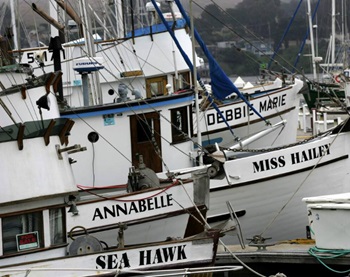 The bad news keeps piling up for the North Coast’s beleaguered fishing industry. Crab season was delayed yet again this winter, and now salmon season may be canceled entirely for the second consecutive year. Even a hopeful development — the ongoing removal of four obsolete hydroelectric dams on the Klamath River — turned sour when as many as 830,000 hatchery fish died within days after being released in the Klamath, apparently because of high water pressure inside a bypass tunnel at Iron Gate Dam. Commercial and sport fishing have supported families in Bodega Bay, Fort Bragg and other North Coast towns for generations. “The identity of Bodega Bay is fishing,” Dick Ogg, a local skipper and president of the Bodega Bay Fisherman’s Marketing Association, told the editorial board. “The town itself, that is what we are, fishermen.” more, >>click to read<< 07:01
The bad news keeps piling up for the North Coast’s beleaguered fishing industry. Crab season was delayed yet again this winter, and now salmon season may be canceled entirely for the second consecutive year. Even a hopeful development — the ongoing removal of four obsolete hydroelectric dams on the Klamath River — turned sour when as many as 830,000 hatchery fish died within days after being released in the Klamath, apparently because of high water pressure inside a bypass tunnel at Iron Gate Dam. Commercial and sport fishing have supported families in Bodega Bay, Fort Bragg and other North Coast towns for generations. “The identity of Bodega Bay is fishing,” Dick Ogg, a local skipper and president of the Bodega Bay Fisherman’s Marketing Association, told the editorial board. “The town itself, that is what we are, fishermen.” more, >>click to read<< 07:01
FFAW pleads with fisheries minister to open market, arguing harvest too much for local processors
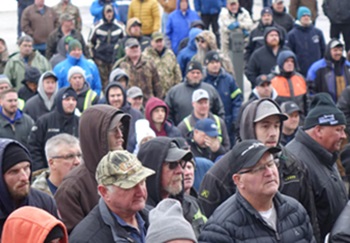 The Fish, Food & Allied Workers union (FFAW) formally urged Fisheries Minister Elvis Loveless to open the fisheries to outside buyers in a letter on Friday, following a week of intensifying protests from harvesters. The letter is a response to Loveless’s own letter from Thursday evening, in which he requested a plan from the union that would guarantee the jobs of all FFAW members, harvesters, and fish plant workers if the market opens. “Any decision to allow outside buyers must consider the impacts on all partners in the seafood industry, and particularly on fish plant workers,” Loveless says in his letter, adding that if such a plan is presented by the FFAW, the government will consider opening the market to outside buyers for snow crab. more, >>click to read<< 19:38
The Fish, Food & Allied Workers union (FFAW) formally urged Fisheries Minister Elvis Loveless to open the fisheries to outside buyers in a letter on Friday, following a week of intensifying protests from harvesters. The letter is a response to Loveless’s own letter from Thursday evening, in which he requested a plan from the union that would guarantee the jobs of all FFAW members, harvesters, and fish plant workers if the market opens. “Any decision to allow outside buyers must consider the impacts on all partners in the seafood industry, and particularly on fish plant workers,” Loveless says in his letter, adding that if such a plan is presented by the FFAW, the government will consider opening the market to outside buyers for snow crab. more, >>click to read<< 19:38






